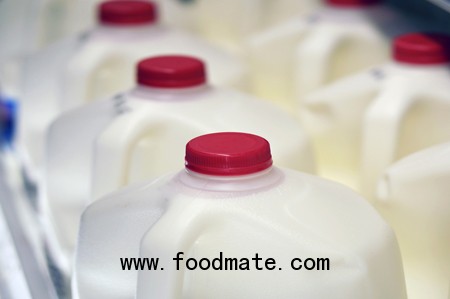
Low milk prices will last well into 2016, food group Danone warned, with demand from Russia and China likely to remain depressed.
Danone’s finance chief Cecile Cabanis told investors that market weakness would last longer than the group had “anticipated before”.
Ms Cabanis pointed “the extension of the Russian ban, and the situation overall of the stocks in China,” saying low prices would extend into “a good part of next year”.
Mid-term recovery
Ms Cabanis was referring to a Russian ban on imports from the European Union, and the backlog of milk powder in Chinese warehouses, which has reduced global milk demand and supressed prices.
But she said that dairy price deflation would not last in the long term.
“Overall, we have said since the beginning that the deflation will not last and that we will see somewhere an inflation coming back and that mid-term we should see the milk back into inflation.”
Stabilising sales
Danone’s dairy sales, which account for half of the group’s revenue, are expected to stabilise early next year, Ms Cabanis told analysts. But the group warned that trading conditions would remain “difficult and unstable overall”.
Danone saw shares rise on Monday after posting better than expected results for the three months to September 30.
Danone is the world’s largest yoghurt maker, and also sells other fresh dairy products and infant formula.
Danone reported like-for-like revenues up 4.6% to E5.64bn, compared to analyst forecasts of a 4.3% rise.
Danone maintained a full-year target for sales growth of 4-5%.
Infant formula sales rise
The company saw its fresh dairy sales, which includes yoghurt, grow by just 0.6%.
But Danone’s infant formula sales rose 10.9%.
The company cited growing exports to China, where demand for baby food underpins the world’s highest commodity milk imports.
“In China, we are convinced about the growth potential of the infant milk formula category and we keep working to strengthen our business model,” Danone said.
Commodity milk demand
Global dairy demand picked up in the reported quarter.
Prices on the GlobalDairyTrade auction site rallied from their early-August lows, up around 63% by the start of August.
New Zealand dairy futures prices are suggesting prices will edge down from the previous events two weeks ago.
Falling supply
But Tobin Gorey of Commonwealth Bank of Australia said data released by New Zealand milk giant Fonterra would support prices.
“Fonterra announced Friday that New Zealand milk collections were down 5% for the first four months of 2015-16 compared to last year – a big fall.
“Clearly supply is falling in New Zealand,” said Mr Gorey. “That should support prices at current levels.”
Danone shares in Paris rose 2.0% to close at E59.41 a share.
Danone’s finance chief Cecile Cabanis told investors that market weakness would last longer than the group had “anticipated before”.
Ms Cabanis pointed “the extension of the Russian ban, and the situation overall of the stocks in China,” saying low prices would extend into “a good part of next year”.
Mid-term recovery
Ms Cabanis was referring to a Russian ban on imports from the European Union, and the backlog of milk powder in Chinese warehouses, which has reduced global milk demand and supressed prices.
But she said that dairy price deflation would not last in the long term.
“Overall, we have said since the beginning that the deflation will not last and that we will see somewhere an inflation coming back and that mid-term we should see the milk back into inflation.”
Stabilising sales
Danone’s dairy sales, which account for half of the group’s revenue, are expected to stabilise early next year, Ms Cabanis told analysts. But the group warned that trading conditions would remain “difficult and unstable overall”.
Danone saw shares rise on Monday after posting better than expected results for the three months to September 30.
Danone is the world’s largest yoghurt maker, and also sells other fresh dairy products and infant formula.
Danone reported like-for-like revenues up 4.6% to E5.64bn, compared to analyst forecasts of a 4.3% rise.
Danone maintained a full-year target for sales growth of 4-5%.
Infant formula sales rise
The company saw its fresh dairy sales, which includes yoghurt, grow by just 0.6%.
But Danone’s infant formula sales rose 10.9%.
The company cited growing exports to China, where demand for baby food underpins the world’s highest commodity milk imports.
“In China, we are convinced about the growth potential of the infant milk formula category and we keep working to strengthen our business model,” Danone said.
Commodity milk demand
Global dairy demand picked up in the reported quarter.
Prices on the GlobalDairyTrade auction site rallied from their early-August lows, up around 63% by the start of August.
New Zealand dairy futures prices are suggesting prices will edge down from the previous events two weeks ago.
Falling supply
But Tobin Gorey of Commonwealth Bank of Australia said data released by New Zealand milk giant Fonterra would support prices.
“Fonterra announced Friday that New Zealand milk collections were down 5% for the first four months of 2015-16 compared to last year – a big fall.
“Clearly supply is falling in New Zealand,” said Mr Gorey. “That should support prices at current levels.”
Danone shares in Paris rose 2.0% to close at E59.41 a share.







